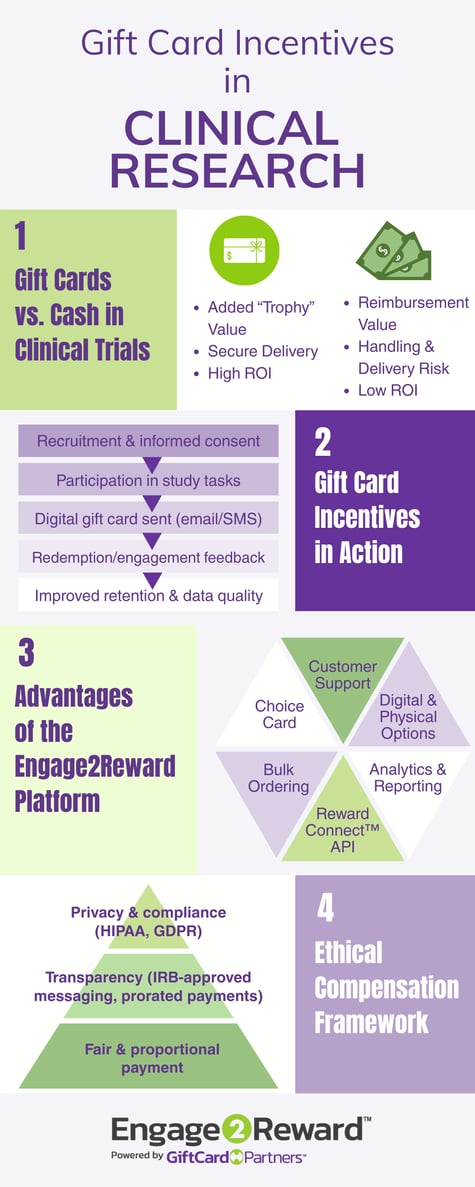Recruiting and retaining participants continues to be one of the biggest challenges in clinical research. A scoping review of randomized controlled trials found that approximately 45% of trials fail to recruit the necessary number of participants within the planned time frame.
Common barriers include travel costs, time constraints, and a lack of trust in the process. One proven way to overcome these barriers is by offering clinical trial participant incentives. Providing research participation compensation shows appreciation for participants' time and effort and helps studies reach broader, more diverse populations.
In recent years, digital gift cards have become the preferred form of clinical research rewards. These flexible, easy-to-use incentives support participant engagement while aligning with IRB guidelines on patient compensation. This article explores why incentives matter, how gift cards outperform other options, the ethical standards for compensation, and how solutions like the Engage2Reward™ Gift Card Ordering Platform simplify the process.
Why Compensation Matters in Clinical Trials
- Incentives attract high-quality participants, especially from hard-to-reach populations.
- Fair compensation improves data quality by reducing rushed responses.
Incentives Improve Retention and Data Quality
- Easy, digital delivery (email or SMS text) or instant in-person delivery creates a smoother participant experience.
- Positive participant experiences increase long-term engagement.
What Are the Benefits of Gift Cards Over Cash in Trials?
Gift cards offer flexibility, improve adherence, reduce logistical issues, and often deliver higher ROI.
Flexibility and Choice
Participants can select the gift card that suits their lifestyle. Popular options include prepaid reward cards and household brands like Amazon.com, Starbucks, Target, and Best Buy®, all available through the Engage2Reward Platform catalog.
Better Adherence
Studies show that digital gift card rewards for patients help improve medication adherence more effectively than cash.
Higher ROI
Research by the Journal of Health Economics shows gift card incentives can provide a return on investment of up to 380%.
Simplified Logistics
Gift cards eliminate the challenges of handling physical cash, making distribution faster and safer.
Perceived Value
Behavioral economics research suggests that incentives can motivate participation when they are framed as gains, rather than an addition to everyday finances.
| Factor | Gift Cards | Cash |
|---|---|---|
| Flexibility | High – multiple retailers | High – wide application |
| Perceived Value | High – choice and trophy value increases motivation | Lower – treated as reimbursement |
| Logistics | Easy, secure digital delivery | Risk of theft, requires handling |
| ROI |
Up to 380% ROI |
Lower |
What Are IRB Guidelines on Patient Compensation?
Payments must be fair, non-coercive, and privacy must be protected. IRBs differentiate between research incentives vs reimbursement:
- Compensation: Payment for time, effort, and inconvenience
- Reimbursement: Repayment for actual costs (e.g., travel, meals)
To comply with IRB guidelines on patient compensation:
- Payments must not be so large that they create undue influence.
- Compensation should be prorated if a participant withdraws early.
- Recruitment language should focus on study value, not just payment.
- Platforms must protect privacy and comply with HIPAA and GDPR.
Implementing Gift Card Incentives Effectively
Use flexible delivery, clear communication, and tracking tools to boost engagement. To run a successful clinical research rewards platform, follow these best practices:
- Clearly explain the study’s purpose and privacy protections.
- Offer a variety of gift cards that fit different lifestyles.
- Deliver rewards digitally, through email or text.
- Send reminder messages on Day 1, Day 5, Day 15, and before expiration.
- Track distribution and redemption for transparency and compliance.
- Prorate payments for participants who withdraw early.
Engage2Reward Platform Features
Powered by GiftCard Partners, the Engage2Reward Platform is a powerful tool for distributing physical and digital gift card rewards for patients securely and efficiently. It supports scalability, security, flexible reward choices, and compliance.
Key features include:
- Customer Support: Rapid, on-shore help for reward delivery issues
- Analytics & Reporting: Transparent, automated tracking and custom dashboards
- Easy Bulk Ordering: Efficient for high-volume studies
- Engage2Reward™ Choice Card: Redeemable for over 250 digital gift card brands
- Reward Connect™ Gift Card API: Integrates reward distribution into existing workflows and platforms

Limitations and Considerations
Incentives must be carefully designed to avoid coercion and maintain ethical standards. While incentives offer many benefits, researchers should be mindful of potential challenges:
- Undue Influence: Excessive payments may pressure economically vulnerable participants.
- Overemphasis on Rewards: May distract from the study’s scientific purpose. The way incentives are framed influences participants’ behavior.
- Cash Might Be Preferable: In some cases, cash may better address participants’ immediate needs.
- Cultural Sensitivities: Perceptions of incentives may vary by population or region.
- Local policies and tax implications. Institutions may limit the maximum value of gift cards (e.g., OSU’s $100 per subject per year cap) and require reporting for payments over certain thresholds.
Scenario-Based Guidance
For Academic Researchers:
Use incentives to broaden participation from underrepresented groups. Ensure your IRB documentation clearly distinguishes compensation vs reimbursement.
For Pharmaceutical Sponsors:
Incentives can improve protocol adherence and reduce dropout rates. Platforms like Engage2Reward streamline compliance reporting and support large-scale deployment.
For IRB Members:
Review incentive structures carefully. Focus on fairness, proportionality, and clarity in recruitment materials.
Conclusion: Creating Ethical, Effective Incentive Programs
Gift card incentives for clinical research are a proven way to improve recruitment, boost retention, and increase data quality while respecting ethical standards. Compared to cash, gift cards offer better flexibility, higher perceived value, and fewer administrative challenges.
When designing a compensation strategy:
- Follow ethical standards
- Align with IRB guidelines on patient compensation
- Protect participant privacy
- Choose a secure, scalable solution like the Engage2Reward Platform
With thoughtful planning and the right tools, clinical trial participant incentives can improve the research experience for participants and the outcomes for study sponsors.
Contact our team today to power your research with meaningful incentives.












.png?width=600&height=600&name=3D8DC522-2245-490E-AA26-63567A199A4C%20.png)